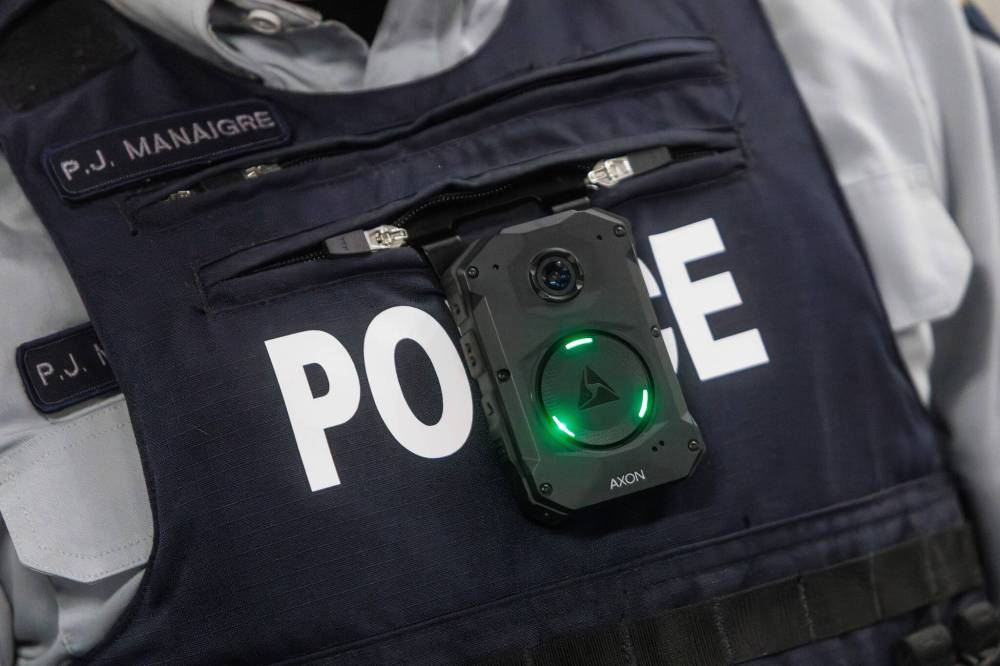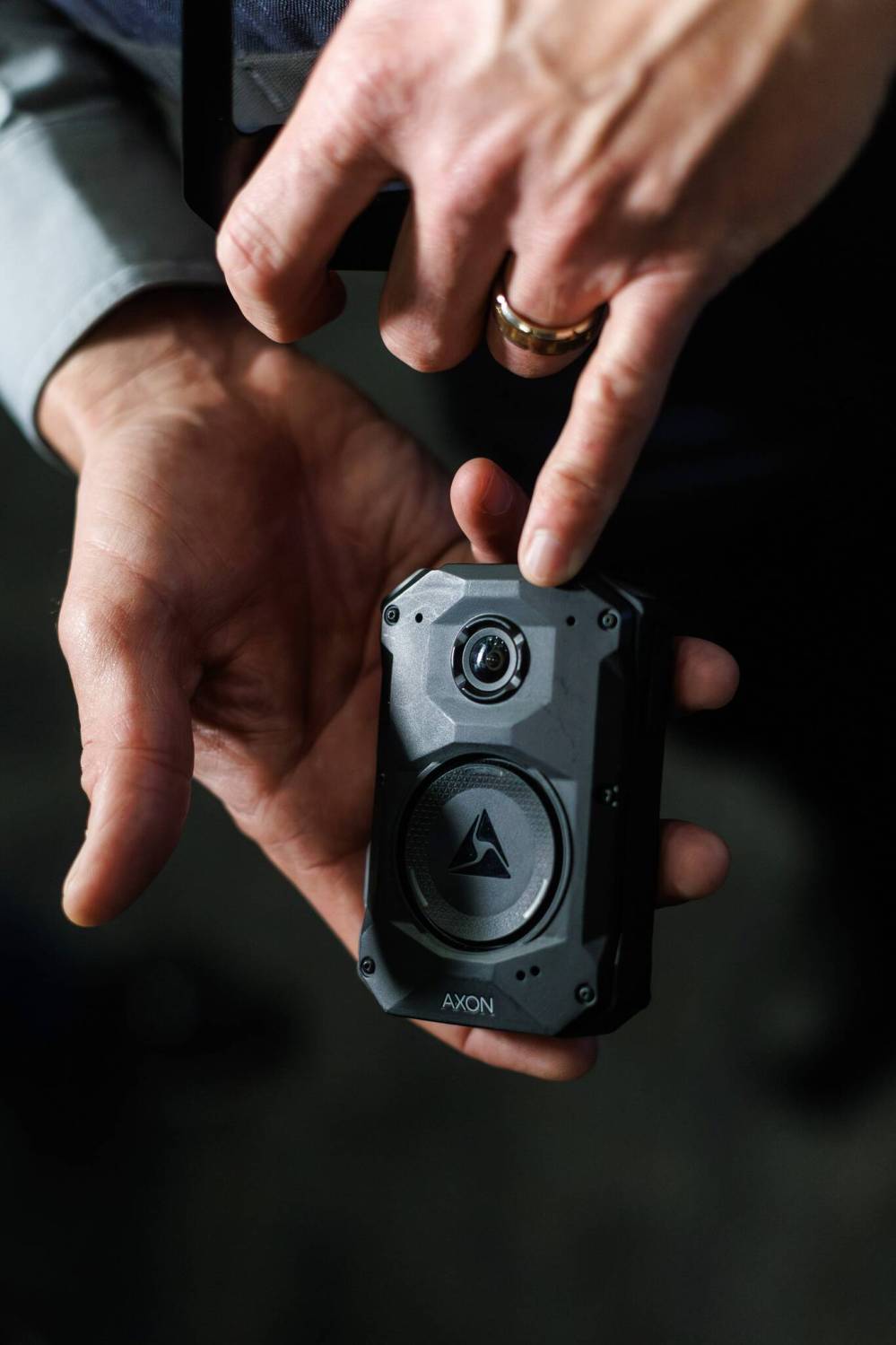Manitoba RCMP roll out bodycams; Shoppers Drug Mart, Superstore testing tech
Advertisement
Read this article for free:
or
Already have an account? Log in here »
To continue reading, please subscribe:
Monthly Digital Subscription
$0 for the first 4 weeks*
- Enjoy unlimited reading on winnipegfreepress.com
- Read the E-Edition, our digital replica newspaper
- Access News Break, our award-winning app
- Play interactive puzzles
*No charge for 4 weeks then price increases to the regular rate of $19.00 plus GST every four weeks. Offer available to new and qualified returning subscribers only. Cancel any time.
Monthly Digital Subscription
$4.75/week*
- Enjoy unlimited reading on winnipegfreepress.com
- Read the E-Edition, our digital replica newspaper
- Access News Break, our award-winning app
- Play interactive puzzles
*Billed as $19 plus GST every four weeks. Cancel any time.
To continue reading, please subscribe:
Add Free Press access to your Brandon Sun subscription for only an additional
$1 for the first 4 weeks*
*Your next subscription payment will increase by $1.00 and you will be charged $16.99 plus GST for four weeks. After four weeks, your payment will increase to $23.99 plus GST every four weeks.
Read unlimited articles for free today:
or
Already have an account? Log in here »
Hey there, time traveller!
This article was published 17/03/2025 (256 days ago), so information in it may no longer be current.
Despite struggles to get body-worn camera tech working in remote areas, one-third of Manitoba RCMP officers have been fitted with cameras since a nation-wide roll-out began in November.
Manitoba detachments’ efforts have been complicated by the wide disparity of internet service and cabling infrastructure across the province, said Steve Rogers, RCMP Manitoba’s body-worn camera delivery manager.
While some rural areas, such as Thompson, Grand Rapids and Gillam already had good infrastructure in place, many others, including remote First Nations communities, don’t have the bandwidth to handle the data collection of thousands of hours of camera footage and the digital evidence management system that is being introduced with the cameras.
A third of Manitoba's RCMP officers have been outfitted with body cameras since a nation-wide roll-out began in November.Manitoba’s infrastructure gaps were, in some areas, comparable to those seen in the northern territories, Rogers said.
“We needed to do something to kind of equalize the services we offer,” he said Monday.
“There’s a lot of First Nations up north that don’t have that proper infrastructure that exists, and normally we’ve used commercial means, so we had to figure out a way to get the service to the people here, because it’s not fair to them.”
The program has pivoted from the original plan of setting up new landlines in these communities to installing Starlink routers tasked with handling body-camera data, described by Rogers as a quicker and less-expensive route.
They always get their cams
RCMP detachments already equipped:
Amaranth
Beausejour
Boissevein
RCMP detachments already equipped:
Amaranth
Beausejour
Boissevein
Brandon
Dauphin
Fisher Branch
Gimli
Grand Marais
Hamiota
Killarney
Melita
Minnedosa
Neepawa
Oakbank
Portage La Prairie
Red River North
St Pierre Jolys
Ste. Rose du Lac
Selkirk
Shoal Lake
Sprague
Steinbach
Treherne
Wasagaming
To come:
• March 18:
Reston
Virden
Carman
Manitou
Morden
• March 20:
Roblin
Russell
• March 24:
Gypsumville
• March 25:
Grand Rapids
• March 26:
Chemawawin
• April 7:
Cranberry Portage
Flin Flon
Leaf Rapids
Lynn Lake
Nelson House
South Indian Lake
Thompson Rural
• April 9:
Winnipegosis
• April 14:
Norway House
• April 15:
Emerson
Falcon Beach (Lac du Bonnet)
Lac Du Bonnet
Morris
• April 17:
Richardson Winnipeg International Airport
• April 22:
Churchill
That shift has allowed them to roll out body cameras at a higher rate than originally planned. There are currently 223 RCMP officers (or about 35 per cent of the force) fitted with body cams across 26 detachments and two traffic units, with 73 communities scheduled to get the technology before July 1.
There have been more than 13,000 videos uploaded to the RCMP’s digital evidence management system, along with 4,411 images and 288 audio statements since the rollout began.
While still in its early stages, Rogers said the new program is already saving officers time and moving policing into the modern age.
“We can share (evidence) electronically, straight to (the) Manitoba Prosecution (Service)… officers don’t have to physically go somewhere to pick up a USB, like to a gas station, if someone didn’t pay for their gas, right? So there are some time savings,” he said.
“We don’t have to make physical copies of that evidence anymore, burn it to a DVD and then mail it to a Crown office.”
The federal government has promised $238.5 million over six years and $50 million in ongoing funding for the cameras, which are provided through a subscription service by Axon, a U.S.-based weapons and technology company.
The cameras cost approximately $3,000 each.
Meanwhile, a major retailer is testing staff-worn cameras.
Three Shoppers Drug Marts, along with three Real Canadian Superstore locations are testing the equipment in an effort to help de-escalate situations, and create a safer environment for both customers and employees.Some employees at three Shoppers Drug Marts (1155 Main St., 43 Osborne St. and 43 Marion St.), along with Real Canadian Superstore locations at 2132 McPhillips St. and 1578 Regent Ave., joined a pilot project in February to “help de-escalate situations and create a safer experience for both customers and colleagues,” a spokesperson for parent company Loblaw said in an email.
”Only trained asset protection representatives, third-party security, store management and additional team members where applicable will be wearing the cameras,” the spokesperson said.
“Participation in this pilot is voluntary. If the footage is not required for investigation, it is deleted as soon as possible.”
At least one staff member was wearing a camera at the Osborne Shoppers Drug Mart.
“It’s safeguard for the employees, because they have proof that they haven’t done anything crazy, and a safeguard for the regular public.”– Joan Gillis, a shopper at the Osborne Shoppers Drug Mart
“It’s safeguard for the employees, because they have proof that they haven’t done anything crazy, and a safeguard for the regular public, if there is something, then there’s evidence of something,” shopper Joan Gillis said after walking out of the store.
Local grocery chain Food Fare co-owner Munther Zeid said, if it was affordable, he’d consider doing the same for his own businesses.
“When you’re dealing with people, the biggest issue sometimes is the store cameras,” he said. “They come in, they sort of are paying attention to cameras, they’re trying to avoid their faces from being seen on the cameras.”
While body cameras have been touted as a safety and accountability tool, skeptics say the data collected over the past two decades shows there isn’t any correlation between body cameras and better policing.
“Surveillance is not going to fix this pattern of people being hungry, of people needing basic necessities to help their families.”– Kevin Walby, criminal justice associate professor at the University of Winnipeg
“There’s no criminological evidence that they’re effective, that they have any efficacious effect,” said Kevin Walby, an associate professor in the department of criminal justice at the University of Winnipeg.
Private-sector retailers putting body cameras on workers is a worrisome example of overt surveillance encroaching another part of everyday life, he said.
“Surveillance is not going to fix this pattern of people being hungry, of people needing basic necessities to help their families,” he said.
“Surveillance isn’t going to help those people at all — it might hurt them, if they get criminalized, if they get sent to jail as a result of this more hyper-vigilant surveillance context that we’re creating.”
malak.abas@freepress.mb.ca

Malak Abas is a city reporter at the Free Press. Born and raised in Winnipeg’s North End, she led the campus paper at the University of Manitoba before joining the Free Press in 2020. Read more about Malak.
Every piece of reporting Malak produces is reviewed by an editing team before it is posted online or published in print — part of the Free Press‘s tradition, since 1872, of producing reliable independent journalism. Read more about Free Press’s history and mandate, and learn how our newsroom operates.
Our newsroom depends on a growing audience of readers to power our journalism. If you are not a paid reader, please consider becoming a subscriber.
Our newsroom depends on its audience of readers to power our journalism. Thank you for your support.








